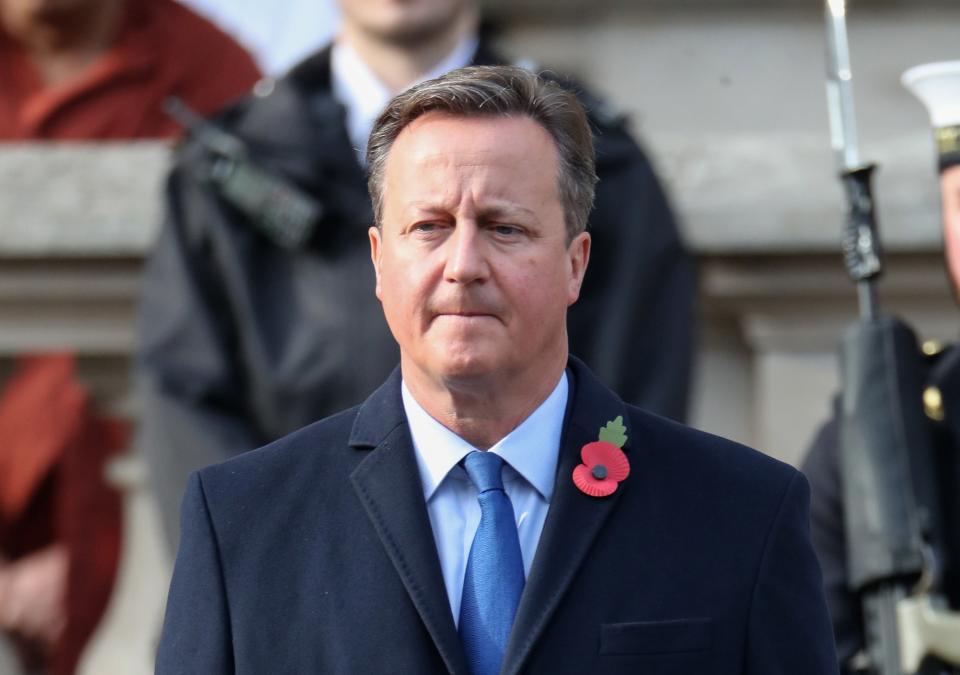A brief history of Westminster sleaze

Former prime minister David Cameron is under scrutiny for his dealings with Greensill Capital
(Getty)If there’s one thing more inevitable than MPs getting caught up in sleaze and misbehaviour scandals, it’s that whatever new rules emerge as a result will turn out to be unable to prevent new scandals occurring.
What does change, however, is the seriousness with which different governments deal with allegations of impropriety or misbehaviour, with Boris Johnson’s administration seemingly far more willing to allow ministers and advisers to “get away with it” than its predecessors were.
The word “sleaze” first came to wide public prominence as a result of the “cash for questions” affair of 1994, when Tory MPs Neil Hamilton and Tim Smith were forced to resign from government jobs after then Harrods owner Mohamed al-Fayed revealed he had given them money in brown paper envelopes to ask questions in parliament. The affair also led to the jailing of former defence minister Jonathan Aitken over secret meetings with Saudi representatives.
This prompted the creation by Lord Nolan of the “seven principles of public life” which all holders of public office were supposed to follow – selflessness, integrity, objectivity, accountability, openness, honesty and leadership.
Having made hay with allegations of “Tory sleaze”, as he put John Major’s flailing administration to the sword, Tony Blair perhaps felt more obliged than most to show he was living up to them.
In his governments, ministers tumbled on a regular basis for a bizarre range of misdemeanours, from Ron Davies’s “moment of madness” when he was mugged by a man he had agreed to go for a meal with after meeting on Clapham Common, to Stephen Byers – eventually – after his special adviser suggested that 9/11 was “a very good day to get out anything we want to bury”.
So determined was Blair to show that his government was “whiter than white” that he even sacrificed two of his most senior lieutenants twice. Peter Mandelson was forced out over an undeclared home loan from a fellow minister and for allegedly trying to help a donor to the Millennium Dome with a passport application. And David Blunkett quit twice over allegedly trying to fast-track a visa for a lover’s nanny and ahead of an investigation into a paternity test company, which eventually cleared him of any conflict of interest.
The rigour did not, however, appear to apply to Blair himself, who famously brushed off questions about links with Formula 1 boss Bernie Ecclestone by saying he was “a pretty straight kind of guy”.
The parliamentary expenses scandal of 2009 claimed a swathe of ministerial scalps in Gordon Brown’s government, and David Laws was forced out of the cabinet over expenses within days of the creation of the coalition government in 2010.
Since those years, the bar for forcing a minister from office has seemingly become higher. Ministerial resignations under David Cameron dropped to around 1.5 a year, with Chris Huhne going ahead of a trial, which saw him jailed for trying to dodge a speeding ticket, Andrew Mitchell for allegedly calling a policeman a “pleb” and Liam Fox for breaking the ministerial code by allowing a friend into ministerial meetings.
Boris Johnson has shown himself even less willing to lose advisers and ministers to scandal. While he has repeatedly been ready to force MPs and ex-ministers out of the Conservative Party for defying him over Brexit, he hung on to close lieutenant Dominic Cummings for months despite evidence that his breach of lockdown was undermining public compliance with Covid rules. And he was prepared to see his independent adviser on ethics resign rather than accept his finding that home secretary Priti Patel had bullied staff.
Johnson’s reluctance to allow breaches of the Nolan principles to force his allies out has led to growing calls for decision making powers on the code to be taken out of his hands. That pressure can only increase after his decision that the Boardman inquiry into the Greensill affair will report to him and he will have the final say on the punishment – if any – for any ministerial misbehaviour which it finds.
Yours,
Andrew Woodcock
Political editor
Read More
Greensill: ‘All decisions taken by the bank were made independently’, minister says

 Yahoo Finance
Yahoo Finance 